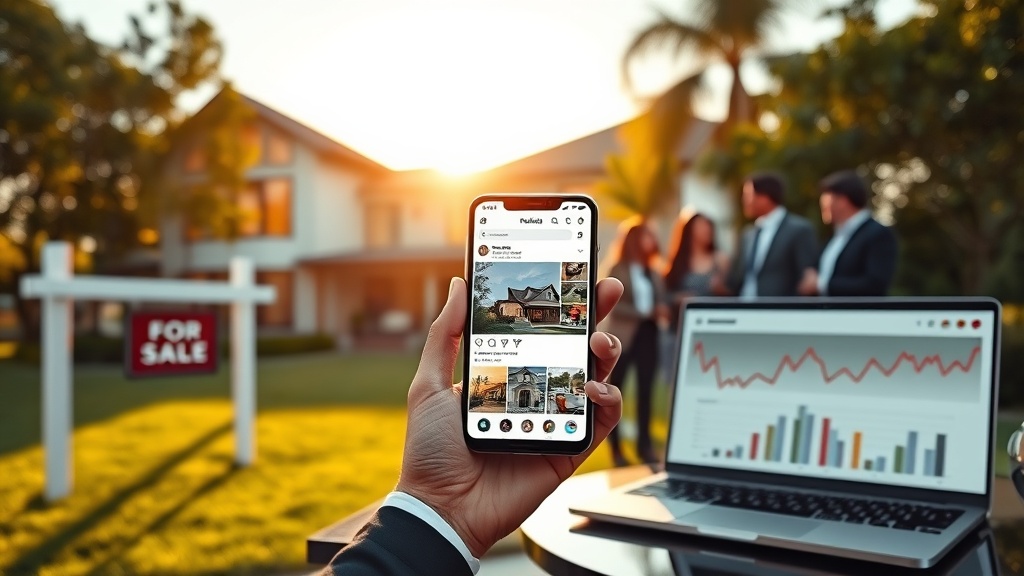Leveraging Social Media Analytics for Real Estate Success

" "
Hello, savvy real estate enthusiasts! Today, we're diving into the bustling world of social media analytics and how it can transform your real estate business. Whether you're a seasoned agent, a broker, or just starting your real estate journey, understanding and utilizing social media analytics can provide a significant edge in this competitive market.
Understanding the Power of Social Media in Real Estate
The Rise of Social Media in Real Estate
Social media has become an integral part of our daily lives, with platforms like Facebook, Instagram, Twitter, and LinkedIn connecting millions of people worldwide. In the realm of real estate, social media has transitioned from a mere marketing channel to a dynamic platform for engaging with clients, showcasing properties, and building a reputation.
Historically, real estate relied heavily on traditional methods such as print advertising, radio spots, and open houses. However, as the internet evolved, so did marketing strategies. The shift began in the early 2000s when real estate agents started recognizing the potential of online listings. Fast forward to today, and social media has revolutionized how properties are marketed and sold.
Current Trends
Currently, more than ever, potential buyers are turning to social media for property searches and real estate advice. Visual-centric platforms like Instagram and Pinterest are particularly popular for showcasing properties through photos and videos. Meanwhile, LinkedIn allows for professional networking, and Facebook provides a platform for community discussions and property listings.
The integration of virtual tours and live videos on platforms like Facebook and Instagram has also enhanced the buyer's experience, allowing potential clients to explore properties from the comfort of their homes. This trend has accelerated due to the recent global challenges that emphasized remote interactions.
What is Social Media Analytics?
Definition and Importance
Social media analytics involves collecting data from social media platforms and analyzing it to make informed business decisions. For real estate professionals, this means understanding which content resonates with audiences, identifying trends, and optimizing marketing strategies accordingly.
Key Metrics
Here are some key metrics real estate professionals should focus on:
Engagement Rate: Measures how actively your audience is interacting with your content. High engagement rates often indicate content that resonates well with viewers.
Reach and Impressions: Reach refers to the number of unique users who see your content, while impressions indicate the total number of times your content is displayed.
Click-Through Rate (CTR): The percentage of people who clicked on a link in your post compared to the number of people who viewed the post. This metric helps in understanding the effectiveness of calls to action.
Conversion Rate: Measures the percentage of users who take a desired action after engaging with your content, such as signing up for a newsletter or scheduling a property tour.
Leveraging Analytics for Real Estate Success
Building a Strong Online Presence
To succeed in real estate, having a robust online presence is crucial. Here's how analytics can help:
Content Optimization: By analyzing which posts have the highest engagement, you can tailor future content to align with audience preferences. For instance, if property tour videos receive more likes and shares, consider creating more of them.
Consistent Branding: Use analytics to ensure your branding is consistent across all platforms. Analyze how your brand messaging is received by different audience segments and adjust accordingly for a cohesive brand image.
Identifying Target Audience
Understanding your target audience is key to successful marketing. Social media analytics can help identify demographic information such as age, location, and interests:
Audience Insights: Platforms like Facebook provide detailed insights into your audience demographics. Use this data to create buyer personas that guide your marketing efforts.
Targeted Advertising: Leverage analytics to run targeted ad campaigns that reach specific segments of your audience. For example, promote luxury listings to affluent demographics.
Enhancing Customer Engagement
Engaging with your audience builds trust and fosters relationships. Here's how analytics can enhance this engagement:
Interaction Patterns: Analyze when your audience is most active online to post content during peak times for maximum visibility.
Feedback Loop: Use sentiment analysis to gauge public opinion about your brand and services. Address negative feedback promptly to maintain a positive reputation.
Monitoring Competitors
Keeping an eye on competitors is essential for staying competitive. Social media analytics can provide insights into competitor strategies:
Competitive Benchmarking: Analyze competitor engagement rates, content strategies, and audience size. Identify areas where you can improve or differentiate your offerings.
Trend Analysis: Stay ahead of market trends by observing what types of content your competitors are posting. Adapt successful strategies to your own marketing plan.
Real-World Scenarios
Scenario 1: Increasing Property Listings Engagement
Imagine a real estate agent named Sarah, who notices her property listings on Instagram aren't generating the desired engagement. By using social media analytics, she discovers that her audience engages more with video content than static images. Sarah decides to create short, engaging video tours for her listings, showcasing the property's features and neighborhood highlights. Within a month, her engagement rates double, and she receives more inquiries from potential buyers.
Scenario 2: Targeted Advertising for a Luxury Real Estate Firm
A luxury real estate firm wants to attract high-net-worth individuals to its new waterfront properties. By analyzing social media data, they identify that their target audience is most active on LinkedIn. The firm launches a targeted ad campaign on LinkedIn, featuring high-quality images and virtual tours of the properties. The campaign results in increased website traffic and several successful sales, demonstrating the efficacy of data-driven advertising strategies.
Future Implications
Technological Advancements
As technology continues to evolve, so will social media analytics. Future advancements may include:
AI and Machine Learning: These technologies could provide even deeper insights into consumer behavior, predicting trends and optimizing content in real-time.
Augmented Reality (AR): AR could enhance virtual property tours, providing potential buyers with an immersive experience. Analytics will play a role in understanding how users interact with these technologies.
Ethical Considerations
With great power comes great responsibility. Real estate professionals must navigate ethical considerations, such as:
Data Privacy: Ensuring compliance with data protection regulations to maintain client trust.
Transparency: Being transparent about data usage and respecting user preferences.
Conclusion
Leveraging social media analytics for real estate success is no longer optional—it's imperative. By understanding your audience, optimizing content, and staying ahead of trends, you can transform your real estate business and achieve unparalleled success. Embrace the power of data, and let it guide you on your journey to a thriving real estate career.
So, are you ready to take your real estate game to the next level? Dive into the world of social media analytics and unlock the potential that awaits!
Happy selling, and until next time!











